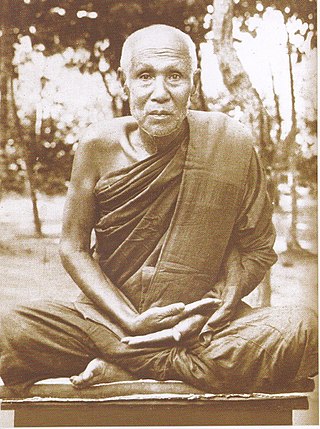Theravāda is the most commonly accepted name of Buddhism's oldest existing school. The school's adherents, termed Theravādins, have preserved their version of Gautama Buddha's teaching or Dhamma in the Pāli Canon for over two millennia.

A bhikkhu is an ordained male in Buddhist monasticism. Male, and female monastics (bhikkhunī), are members of the Sangha.
Śrāvaka (Sanskrit) or Sāvaka (Pali) means "hearer" or, more generally, "disciple". This term is used in Buddhism and Jainism. In Jainism, a śrāvaka is any lay Jain so the term śrāvaka has been used for the Jain community itself. Śrāvakācāras are the lay conduct outlined within the treaties by Śvetāmbara or Digambara mendicants. "In parallel to the prescriptive texts, Jain religious teachers have written a number of stories to illustrate vows in practice and produced a rich répertoire of characters.".

Phra VisuddhisamvaratheraAM, known as Ajahn Brahmavaṃso, or simply Ajahn Brahm, is a British-born Buddhist monk. Ordained in 1974, he trained in the Thai Forest Tradition of Theravada Buddhism under his teacher Ajahn Chah. Currently, Ajahn Brahm is the abbot of Bodhinyana Monastery in Serpentine, Western Australia, as well as an adviser or patron of various Buddhist organizations in Australia, Singapore, and the UK.
Ayya is a Pali word, translated as "honourable" or "worthy".
A Dharma name is a new name acquired during both lay and monastic Buddhist initiation rituals in Mahayana Buddhism and monastic ordination in Theravada Buddhism. The name is traditionally given by a Buddhist monastic, and is given to newly ordained monks, nuns and laity. Dharma names are considered aspirational, not descriptive.

The Kammaṭṭhāna Forest Tradition of Thailand, commonly known in the West as the Thai Forest Tradition, is a lineage of Theravada Buddhist monasticism.

A sāmaṇera, is a novice male monk in a Buddhist context. A female novice nun is in Pali: sāmaṇerī, and in Sanskrit: śrāmaṇerī or śrāmaṇerikā. In Tibetan Buddhism, a female novice nun is known by the Tibetan language term getsulma, and a male novice monk is a getsul.

Ajahn Maha Bua was a Thai Buddhist monk. He was thought by many of his followers to be an arahant. He was a disciple of the esteemed forest master Ajahn Mun Bhuridatta, and was himself considered a master in the Thai Forest Tradition. Following the death of Ajahn Thate in 1994, he was considered to be the Ajahn Yai of the Thai Forest Tradition lineage until his death in 2011.

Ajahn Sao Kantasilo (1859–1942) was a monk in the Thai Forest Tradition of Theravada Buddhism. He was a member of the Dhammayuttika Nikaya.

Ajahn is a Thai- and Lao-derived term that translates as "professor" or "teacher". The term is in turn derived from the Pali word ācariya and is a term of respect, similar in meaning to the Japanese sensei. It is used as a title of address for high school and university teachers, and for Buddhist monks who have passed ten vassa – in other words those who have maintained their monastic precepts unbroken for a period of ten years. The term Luang Por, "Venerable father", signifies an ajahn of acknowledged seniority in Thai Buddhism.
Piya Tan Beng Sin, also known as Piya Tan or Piyasilo, is a Peranakan full-time lay Buddhist writer-cum-teacher in Singapore. He actively teaches the Buddha's Dharma, meditation and Pali to various Buddhist groups and organisations, and also works as a meditation therapist and counsellor at The Minding Centre (TMC). He is the first full-time lay Dharma worker ("Dharmacari") in Singapore to be supported by donations from the Buddhist community.

A kyaung is a monastery (vihara), comprising the domestic quarters and workplaces of Buddhist monks. Burmese kyaungs are sometimes also occupied by novice monks (samanera), lay attendants (kappiya), nuns (thilashin), and white-robed acolytes.
Thero is an honorific term in Pali for senior bhikkhus and bhikkhunis in the Buddhist monastic order. The word literally means "elder". These terms, appearing at the end of a monastic's given name, are used to distinguish those who have at least 10 years since their upasampada. The name of an important collection of very early Buddhist poetry is called the Therigatha, "verses of the therīs".

Ajahn Sucitto is a British-born Theravada Buddhist monk. He was, between 1992 and 2014, the abbot of Cittaviveka, Chithurst Buddhist Monastery. Sucitto was born in London and ordained in Thailand in March 1976. He returned to Britain in 1978 and took up training under Ajahn Sumedho at the Hampstead Buddhist Vihara. In 1979 he was one of the small group of monks, led by Ajahn Sumedho, who established Cittaviveka, Chithurst Buddhist Monastery, in West Sussex. In 1981 he was sent up to Northumberland to set up a small monastery in Harnham, which subsequently became Aruna Ratanagiri. In 1984 he accompanied Ajahn Sumedho in establishing Amaravati Buddhist Monastery in Hertfordshire. In 1992 he was appointed abbot of Cittaviveka. On 26 October 2014, he resigned the post, but intends to continue teaching as before.
U Nārada, also Mingun Jetawun Sayādaw or Mingun Jetavana Sayādaw, was a Burmese monk in the Theravada tradition credited with being one of the key figures in the revival of Vipassana meditation.

The Forest Tradition of Ajahn Chah is a Mahanikai monastic organization in the Thai Forest Tradition composed of the students of Ajahn Chah Subhaddo. Strictly speaking, the Forest Tradition of Ajahn Chah denotes the institutions who have a branch affiliation with Wat Pah Pong, the administrative center of the organization.

Sujato, known as Ajahn Sujato or Bhikkhu Sujato, is an Australian Buddhist monk ordained into the Thai forest lineage of Ajahn Chah.











